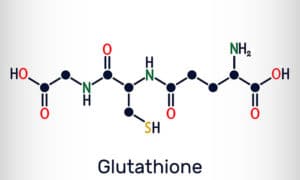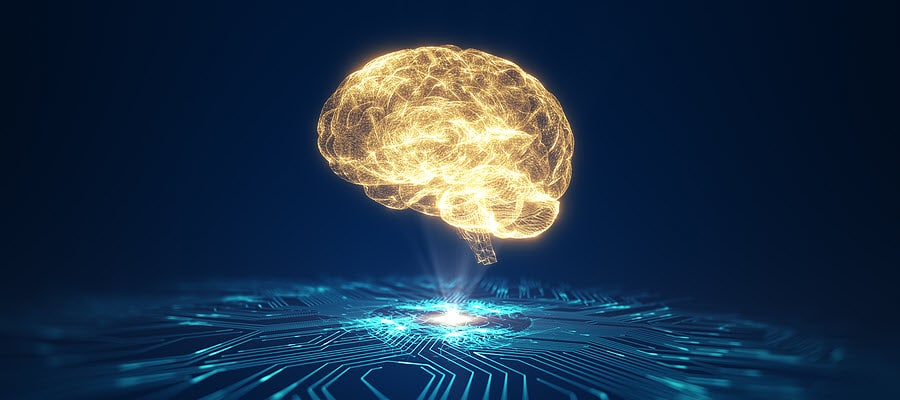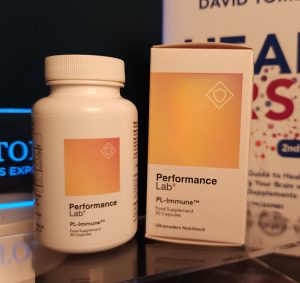Table of Contents
Glutathione (γ-l-glutamyl-l-cysteinyl-glycine, GSH or L-glutathione) is a tripeptide made up of cysteine, glycine, and glutamine and present in high concentrations in every cell in your body. [i]
As an antioxidant, glutathione’s primary role is to protect your cells from free radical damage. And plays a vital role in detoxification.
Glutathione protects against chronic illness, supports liver health, and reduces insulin resistance. Some research shows that glutathione may even help prevent the progression of cancer.[ii]
The benefits of supplementing with glutathione may help prevent and even reduce the symptoms associated with emotional and mental health disorders.
Other glutathione benefits include improved digestion, clearer skin, stronger hair and nails, and healthier vison.
Glutathione is unique because it can help improve the health of nearly all cell types in your body. Including your brain, liver, eyes, skin, pancreas, or any other organ that requires support.
As a nootropic, glutathione boosts memory, clearer thinking, and helps prevent neurodegenerative disease such as Alzheimer’s disease and dementia. And boosts energy levels.
In this review we’ll focus on how Glutathione works in your brain.
Glutathione helps:
- Antioxidant: Glutathione is called the “master” antioxidant because it’s needed by every nearly every cell to defend against free radicals. Free radicals in excess can lead to oxidative stress which causes inflammation and can damage or kill brain cells.
- Neuroprotectant: The production of adenosine triphospate (ATP) in your mitochondria releases Reactive Oxygen Species (ROS) causing oxidative stress. Glutathione is your primary defense against ROS preventing mitochondrial dysfunction.[iii]
- Brain optimization: Supplementing with glutathione may help reduce brain fog and poor cognition. Glutathione plays a role in preventing and treating neurodegenerative disease, including Alzheimer’s disease, bipolar disorder, obsessive compulsive disorder (OCD) and autism.[iv] [v]
Overview
Glutathione (γ-l-glutamyl-l-cysteinyl-glycine, GSH, or L-glutathione) is found in nearly every cell in your brain and body.
 Glutathione synthesis in your brain follows the same pathway as in the rest of your body. Glutathione is synthesized in cells by the consecutive reactions of the enzymes γ-Glutamyl-cysteine (γGlu-Cys) synthetase which uses glutamate and cysteine as substrates to generate γGlu-Cys.
Glutathione synthesis in your brain follows the same pathway as in the rest of your body. Glutathione is synthesized in cells by the consecutive reactions of the enzymes γ-Glutamyl-cysteine (γGlu-Cys) synthetase which uses glutamate and cysteine as substrates to generate γGlu-Cys.
This dipeptide is combined with glycine to glutathione in a reaction catalyzed by Glutathione synthetase. ATP is a co-substrate for both enzymes.
The intracellular level of Glutathione is regulated by a feedback inhibition of γGlu-Cys synthetase by the end product Glutathione.
Glutathione synthesis is dependent on the availability of glutamate, cysteine, and glycine.
You can increase your body’s glutathione production by eating foods that contain the basic components of these amino acids.
You can get Glutathione from eating onions, garlic, spinach, avocado, asparagus, cruciferous vegetables like broccoli and cauliflower, and meats.
But your digestive tract doesn’t absorb glutathione well. It is rapidly oxidized during digestion. Fortunately, many of the same foods that contain glutathione also contain the individual amino acids glycine, cysteine, and glutamic acid that your body uses to make glutathione.
These foods include eggs, lentils, chicken, fish, dairy products, legumes, garlic, shallots, and onions. And cruciferous vegetables such as broccoli, cauliflower, cabbage, kale, Bok choy, and Brussels sprouts.
Glutathione is so critical to your cellular health that it exists in cells at the same levels as glucose, potassium, and cholesterol. All nutrients that are essential for energy and cellular function.[vi]
As your “master” antioxidant, Glutathione plays a key role in the defense of brain cells against oxidative stress. It neutralizes free radicals, is a cofactor for several antioxidant enzymes, and helps regenerate Vitamin C and Vitamin E already in your system.
Glutathione infusion assists in the transport of heavy metal ions such as mercury out of cells including your brain. It helps regulate cellular growth and apoptosis. And it vital to mitochondrial function and maintenance of mitochondrial DNA.
Your body requires a steady supply of glutathione to function optimally. Glutathione depletion or deficiency has been associated with neurodegenerative diseases such as Alzheimer’s, Parkinson’s, Huntington’s, OCD and even autism.[vii]
Glutathione increases the number of T-cells (white blood cells) in your body, a key component of your immune system. And stimulates the production and activity of natural killer (NK) cells and supports immune cell normal antibody response.[viii]
In fact, glutathione deficiency, and its precursor cysteine, is a feature of HIV. One study showed that supplementing with N-acetyl-L-cysteine (NAC), a precursor to glutathione, caused a significant increase in immune response in HIV-infected patients.[ix]
Your body naturally produces glutathione, but that ability decreases with age. And decreases at any age when you’re under stress.
 How does Glutathione work in the Brain?
How does Glutathione work in the Brain?
Glutathione boosts brain health and function in several ways. But two in particular stand out.
- Glutathione protects brain mitochondria from oxidative stress. Glutathione is the number one antioxidant in your body. As an antioxidant, it neutralizes and scavenges free radicals, protecting your mitochondria from oxidative damage.[x]
Free radicals are molecules with unpaired electrons. Free radicals increase because of various toxins, industrial chemicals, air pollutants, UV light, certain drugs, and pesticides.[xi]
Free radicals in excess pair with other free electrons in cells resulting in decreased cellular function and disease.
Antioxidants such as glutathione attach to free electrons preventing them from causing oxidative stress.[xii]
In your brain, neurons rely on the presence of extracellular cysteine for glutathione synthesis. The best extracellular precursor for glutathione synthesis in your brain is glutamine.
But astrocytes prefer glutamate and cysteine as precursors. In fact, astrocytes play a key role in glutathione metabolism in your brain.[xiii]
- Glutathione helps recycle other antioxidants.
When your brain uses antioxidants such as Vitamin C and Vitamin E, glutathione recycles these important antioxidants and put them back to into play.[xiv] [xv] Enhancing the efficiency of the detoxification process, helping your brain to function optimally.
When your brain has enough glutathione, you can potentially avoid anxiety, depression, and more serious neurodegenerative diseases such as Alzheimer’s, Huntington’s, and Parkinson’s disease.[xvi]
How things go bad
Glutathione exists in cells in 2 states: reduced Glutathione (GSH) and oxidized Glutathione disulfide (GSSG). Oxidized glutathione is 2 glutathione molecules bound together.
 The ratio of GSH to GSSG determines cell redox status. Healthy cells at rest have a GSH/GSSG ratio >100 while the ratio drops to 1 to 10 in cells exposed to oxidative stress.
The ratio of GSH to GSSG determines cell redox status. Healthy cells at rest have a GSH/GSSG ratio >100 while the ratio drops to 1 to 10 in cells exposed to oxidative stress.
Glutathione is depleted because of oxidative stress, inflammation, or exposure to toxins within the cell.[xvii]
Without enough glutathione, your body is more susceptible to a host of cognition problems. And if left unchecked can eventually lead to neurodegenerative diseases such as Alzheimer’s disease, Parkinson’s disease, and dementia.
Glutathione deficiency can also affect your vision, skin health, and ability to think clearly.
Insufficient levels of glutathione can lead to:
↓ Neurodegenerative disease, including Alzheimer’s diseases and Parkinson’s disease
↓ Brain fog
↓ Low energy
↓ Poor digestion
↓ Vision problems
↓ Decreased emotional and mental health[xviii]
↓ Inefficient detoxification of your cells
↑ Greater susceptibility to diabetes, heart disease, and cancer
↑ Increased free radical damage to cells
↑ Inflammatory diseases
You become more susceptible to these problems as you age because your body’s ability to produce glutathione decreases.
Common OTC medications such as acetaminophen (Tylenol®) has been shown to deplete glutathione, especially in your liver. This means that when using acetaminophen, it makes it harder for your body’s immune system to do its job of cleaning out waste products.
But taking Glutathione as a nootropic supplement may help counter the damage caused by oxidative stress when you have no choice but to take an acetaminophen tablet.
 Glutathione benefits
Glutathione benefits
It would be difficult to understate the benefits of having sufficient levels of glutathione in your body. It helps your body detox. And is vital to protecting your cells from free radical damage.
Your brain uses at least 20% of your oxygen supply to function which makes it highly susceptible to oxidative stress. Healthy levels of glutathione helps prevent oxidative stress. And allows your brain to function as designed.
Supplementing with glutathione helps prevent anxiety and depression. Adequate glutathione supports healthy, clear cognition. And helps protect your brain against neurodegenerative diseases and nonalcoholic fatty liver disease as you age.
Glutathione directly scavenges diverse oxidants: superoxide anion, hydroxyl radical, nitric oxide, and carbon radicals.
But glutathione’s benefits aren’t limited to your brain. It plays a protective role in nearly every cell in your body. Protecting you from a variety of degenerative and inflammatory diseases including cystic fibrosis.
How does Glutathione feel?
Neurohackers who supplement with Glutathione report increased energy levels, improved digestion, decreased inflammation, clearer thinking, improved skin tone, and stronger hair and nails.
 As your master antioxidant, glutathione boosts cellular health throughout your system.
As your master antioxidant, glutathione boosts cellular health throughout your system.
People who suffer with Hashimoto’s disease, diabetes, and chronic fatigue syndrome report more energy when using glutathione.
Glutathione can improve digestion, including the symptoms of leaky gut syndrome. And may also ease allergy symptoms.
With the established link between gut health and brain health, it comes as no surprise that many users of glutathione report clearer thinking.
Supplementing with glutathione help you detox, providing clear skin. Many people report that it makes their skin glow. You may find that your hair and nails grow stronger when supplementing with glutathione.
Some say they notice improvement in their hearing, a better sense of smell, and better vision after taking glutathione. It can also help prevent cataracts.[xix] Some people report that glutathione has helped them heal cataracts.
Many people report that glutathione is their best hangover prevention weapon. They say that if they remember to take it on a night when they’ve been drinking too much, they feel little to no effect the next morning.
 Glutathione Clinical Research
Glutathione Clinical Research
With such a widespread detoxifying role throughout your body, glutathione has been shown to positively affect many organs and systems. Here we focus on three that affect cognitive function.
Glutathione for OCD
Several studies suggest lower cerebral levels of glutathione may contribute to obsessive-compulsive disorder (OCD).
Researchers at Harvard Medical School and McLean Hospital in Belmont Massachusetts recruited 29 patients suffering from OCD and 25 matching controls who didn’t have OCD.
The participants brains were scanned using magnetic resonance spectroscopy (MRS) to examine glutathione levels in their posterior cingulate cortex (PCC).
The study found significantly lower glutathione levels in those with OCD compared with the control group.
The research team concluded that lower glutathione levels increased oxidative stress and hypermetabolism in the PCC brain region with OCD. [xx]
Glutathione for Alzheimer’s Disease
A study published in Neuropharmacology studied the effect of glutathione supplementation in mice with biological indicators like those of Alzheimer’s.
Mice were supplemented with glutathione for three weeks. The mice treated with glutathione showed decreased inflammation. And had reduced cognitive decline and less depression and anxiety.
The researchers concluded that glutathione supplementation is attractive as a therapy for reducing oxidative stress and inflammation in the brains of people with Alzheimer’s.[xxi]
Glutathione to Reduce Hangovers
Animal trials have shown that supplementing with glutathione may be useful in preventing hangovers.
In one study, rats in the experimental group were fed a preparation of glutathione-enriched yeast and rice embryo/soybean (GEY/RES) extracts for two weeks. Control rats were not given the GEY/RES.
The rats in both groups were then intoxicated with ethanol and blood alcohol levels were analyzed for several hours.
The rats in the pretreatment group had lower blood concentrations of alcohol. The researchers concluded that glutathione should be studied as a candidate for mitigating hangovers.[xxii]
Glutathione Recommended Dosage
 Recommended nootropic dosage for Reduced or Liposomal Glutathione for immune support is 250 – 1,000 mg per day.
Recommended nootropic dosage for Reduced or Liposomal Glutathione for immune support is 250 – 1,000 mg per day.
Glutathione is not well-absorbed in your digestive system, so the liposomal form of glutathione is preferred.
You can also increase your glutathione levels by supplementing with one of my favorite supplements – N-Acetyl-L-Cysteine (NAC) which is a direct precursor to glutathione.
NAC is easily digested and goes on to help produce glutathione in your liver. Recommended nootropic dosage of NAC is 600 3-times per day.[xxiii] [xxiv]
Glutathione Side Effects
Glutathione is non-toxic. So is considered well-tolerated and safe.
Side effects are rare but can include digestive cramping and bloating, and possible skin rash if you apply glutathione to your skin.
If you have asthma, you should avoid supplementing with glutathione.
And if you are pregnant or breastfeeding, please check with your doctor before beginning glutathione supplementation.
Type of Glutathione to Buy
Glutathione supplements are available in tablet, softgel, capsule, powder, liquid, nasal spray and IV form. Capsules are typically 350 – 500 mg each.
Glutathione exists in cells in 2 states: reduced Glutathione (GSH) and oxidized Glutathione (GSSG).
If you are buying regular glutathione, choose a supplement label that says “Reduced Glutathione” which is the active form your immune system needs. And NOT the oxidized form of “Glutathione”.
Early human clinical trials of supplemental glutathione showed it was not absorbed well as a supplement. And for years it was thought that using GSH precursors were a superior method of increasing stores of this vital antioxidant in your body. But the latest research shows with daily, long-term usage you can raise glutathione levels by supplementing with glutathione.
The best way to increase your glutathione levels is by intravenous glutathione (IV infusion). But this method is expensive and not easily available to the average neurohacker.
So, supplement manufacturers have found another method for boosting glutathione absorption.
It is called “liposomal” which means glutathione is encased in a “sac” of lipid molecules made from soy or sunflower lecithin which makes it easier for the molecule to cross cell membranes into the cell.
A patented form of liposomal glutathione called Setria® Glutathione manufactured by Kyowa Hakko Bio Co. has been shown to be the quickest way to increase your glutathione levels.
A 6-month randomized, double-blind, placebo-controlled trial of Setria® glutathione (GSH) 250 or 1,000 mg per day was conducted with 54 adults.
Blood levels of GSH increased after 1, 3, and 6 months at both doses. At 6 months the low dose group showed 29% GSH levels and the high dose group 35%.[xxv]
 You can get 250 mg Setria® Glutathione in my favorite immune supplement called Click for Performance Lab® Immune .
You can get 250 mg Setria® Glutathione in my favorite immune supplement called Click for Performance Lab® Immune .
Immune™ also contains the NutriGenesis® forms of Vitamin D 20 mcg, Vitamin C 30 mg, Selenium 25 mcg, Zinc 5 mg, and IMMUSE™ Paraprobiotic.
IMMUSE™ is a patented strain of Lactococcus lactis probiotic which also functions to activate your immune system. IMMUSE™ activates plasmacytoid dendritic cells (pDC).
7 clinical trials have shown that pDC can activate immune cells such as NK, Killer-T, Helper-T, and B cells, providing broad range immune support.
Click for Performance Lab® Immune is only $34 for a one-month supply of the best immune supplement available today. Get 3 boxes and Get one box FREE + free shipping.
Nootropics Expert® Recommendation
 Glutathione 250 – 1,000 mg per day
Glutathione 250 – 1,000 mg per day
I recommend glutathione as a nootropic supplement.
Glutathione’s role in immune function is almost unparalleled. Nearly all cells require GSH for healthy function.
Your body makes glutathione on its own, but that ability diminishes when you are experiencing severe stress, a poor diet, and as you get older.
Supplementing with glutathione protects against chronic illness, supports liver health, and reduces insulin resistance. Some research shows that glutathione may even help prevent the progression of cancer. [xxvi]
Glutathione is especially helpful for those dealing with brain fog, poor memory, anxiety, or depression. You should notice better memory, more energy, and the ability to think more clearly when using GSH as a supplement.
Because glutathione supports healthy brain cell function, it may help reduce symptoms of OCD, depression, bipolar disorder, and autism.
Glutathione may help prevent or slow age-related cognitive decline, such as in dementia or Alzheimer’s disease.
And supplementing with glutathione may help vison, poor digestion, unhealthy skin and brittle hair and nails.
The preferred method of supplementing with glutathione is with the patented liposomal form of glutathione such as Setria® Glutathione available in Click for Performance Lab® Immune







Join The Discussion - 44 comments
William
January 29, 2022
Hi David, do you think this is a good brand for L-Glutathione?
(The label says “Reduced Glutathione” but im not sure if the same type of Sertria glutathione)
Bestvite – Reduced Glutathione
David Tomen
January 29, 2022
William, I like the Bestvite Glutathione supplement because it is the “reduced” form that your body uses. Sertria is also reduced glutathione but it’s encased in a phospholipid that further increases its bioavailability.
MALIK
October 12, 2021
Hello David! I am taking performance lab , but I want to increase glutathione intake . What brand can you recommend me to take glutathione only. I take NAC before, I feel slightly good but also get headache . I want to take glutathione only . Thanks
David Tomen
October 13, 2021
Malik, this supplement contains the glutathione you need: https://bit.ly/3ihb5uX and the only other ingredients are some vitamins and a single probiotic.
Otherwise, a standalone “reduced” glutathione supplement if you want the same type of patented Sertria glutathione is: https://amzn.to/3AC7luX
Marcie Webber
September 3, 2021
Thank you David. Is it better to space them? i take NAC 600mg in the morning and GSH late PM 4p. Would that be a good idea to bolster effects in the body?
I just learn too today that Quercetin affects GSH effectiveness and shouldn’t be taken together.
Have u heard about this? I had it together over a month already dosing my 2nd dose of Quercetin with my daily glutathione @ 4p. Thanks again. Your thoughts. You have become my role model and I believe in you!
David Tomen
September 5, 2021
Marcie, there have been several studies done with animals as well as human cells in a petri dish that showed the possibility Quercetin may reduce glutathione levels.
However, a human study using real people found this NOT to be the case and there was no reduction in Glutathione or any other antioxidant status: https://libres.uncg.edu/ir/asu/f/Shanely_Andrew_2010_Quercetin_supplementation_ORIG.X.pdf
Marcie Webber
August 26, 2021
I have bought Setria reduced glutathione 500mg caps from Healthy Origins. When is the best time to take this and is it fat soluble empty stomach?
I read some take it @ night. I dose mine 4p while my NAC 600mg is first thing in AM empty stomach as recommended. Both low dose just once a day.
Thanks David.
David Tomen
August 27, 2021
Marcie, Glutathione is water soluble and there not really a “best time to take it”. You can take Glutathione at the same time as NAC because they both have jobs to do. And your brain uses both versions.
Rifat Al-chadirji
July 26, 2021
Hi David,
Thank you for your valuable information as always. I have been using NAC and loved its effects. However, it makes my asthma flare-up. I always had to use my puffer right after taking it. I was using it for the sake of detox. Do you think taking Glutathione would allow me to detox while circumventing the issue I faced with NAC? Does it even target the Lungs like NAC?
Thank you
David Tomen
July 26, 2021
Rifat, the next obvious option for you to try is Glutathione.
I’m surprised you had the reaction to NAC however. Unless NAC was so effective that the symptoms you were feeling was detox. NAC does not directly target the lungs as far as I know. Correct me otherwise.
If asthma is a recurring problem you may to take a look at trying Quercetin (https://nootropicsexpert.com/quercetin/).
Andrew
July 13, 2021
Could I take this with NAC or is there no point?
can you get too much Glutathion?
https://www.performancelab.com/products/pl-immune
I only take NAC once per day at night just wondering if it would serve any benefit to ad this to the mix
David Tomen
July 13, 2021
Andrew, great question and I have given this some thought. You can stack NAC with PL Immune because of the way glutathione is used in your body and brain. And even in specific cells in your brain.
BTW, I think it may be better to use NAC during the day because of the way it works with dopamine.
Andrew
July 14, 2021
Ok I might get this and keep taking the NAC also
I just thought maybe taking NAC before bed would synthesis better while sleeping healing the brain more, so none are stimulatory
I’ll take one morning one before bed either way swap around see what works best
Jerry
June 16, 2021
You have a 30 day guarantee. What would I expect to experience within the 30 days to indicatge it is helping me?
David Tomen
June 17, 2021
Jerry, I’m not sure what 30-day guarantee you are referring to. Care to share what exactly you are referring to?
Jerry
June 16, 2021
Does this help with TBI
David Tomen
June 17, 2021
Jerry, glutathione and its precursors are depleted following traumatic brain injury. https://www.ncbi.nlm.nih.gov/pmc/articles/PMC6585556/
I think I’ll need to add a section to this review about TBI and glutathione. So it should help. Thanks for asking.